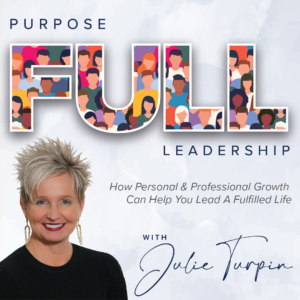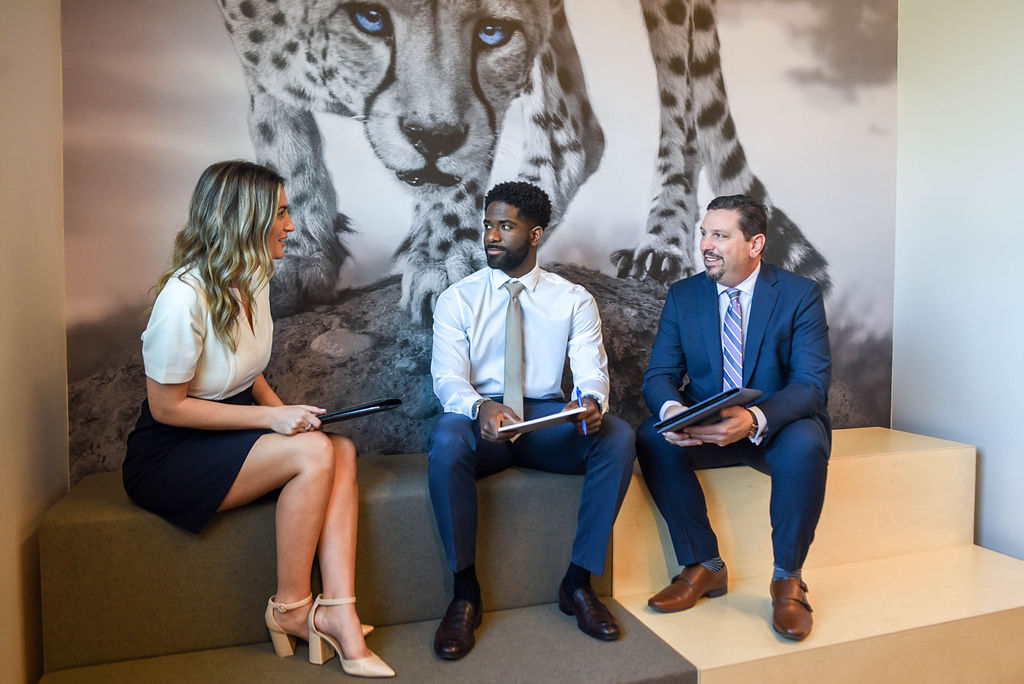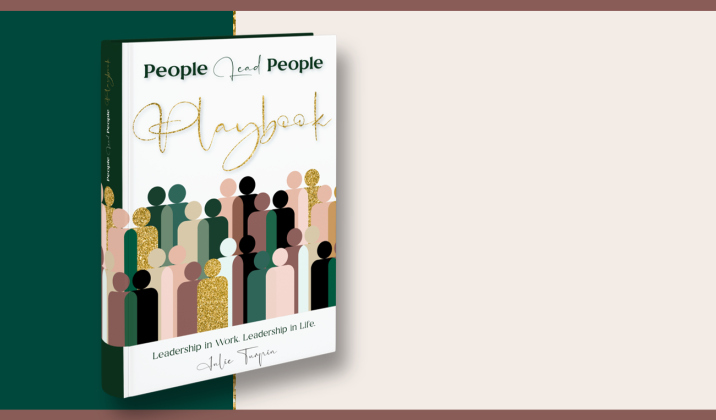4 Key Plays for Winning the Game of Leadership
by Julie Turpin, Chief People Officer at Brown & Brown Insurance
Raise your hand if you are a leader. ✋
I recently asked a room full of women leaders to do this; only half of their hands went up. I then asked, “Are you a mother, sister, spouse, volunteer…?” More and more hands went up.
We often reserve the title of ‘leader’ for those who formally lead teams, organizations or countries. Early in my career, I viewed leadership in this limited way as well.
As chief people officer, I have become the formal “leader” I once thought defined the term responsible for the well-being of 16,000 teammates. And I’m here to tell you that leadership is so much more than having a team reporting to you. It’s about how you influence, inspire and guide those around you, regardless of your official position. It’s about how you show up, your impact on people’s lives and the direction you set for those around you.
What changes when you reach a higher position is the impact your lack of strong leadership can have on the people relying on you. I once found myself thrust into a director role with minimal formal leadership experience, leading a team of 15 to 20 people. My lack of true leadership experience at this time led to a small cohort of my teammates leaving the organization all at once.
It was one of the most fearful and humiliating moments of my career, but eventually, a moment of true growth as I realized I never wanted to be the type of leader others didn’t want to work for.
I’ve spent the rest of my career cultivating the skills of an authentic, fair, compassionate and vulnerable leader. It hasn’t always been a smooth ride, but I’ve learned many lessons and collected many leadership strategies in my playbook.
4 key plays from my leadership playbook
I’d like to share some of what I’ve learned about leadership — from ways to show up for yourself and others to books that have inspired me to advice on how to turn challenging situations into gifts. All of these are a part of my backpack of wisdom that makes up the leadership playbook I’ve been refining for more than 25 years.
The following four plays are some of my most powerful. As you look to become the best leader you can be, consider how you can apply each of these to make the greatest impact on the people you influence.
Play #1: Versatility. Flexing your leadership style to fit the people and situation you want to influence.
Versatility is about the power of perspective — the willingness to embrace diverse perspectives and adapt to different situations and individuals. Doing so allows us to prioritize the views of others over our own and reach the core of what motivates others. When we understand motivations, we are better equipped to support and guide credibly. The resulting trust we earn, in turn, opens doors to more effective communication and collaboration.
How to do this? Practice versatility in your small, daily interactions by being open to other opinions and willing to pivot for others’ needs. It could be as simple as being flexible in meeting schedules or adapting communication styles. These seemingly small practices contributed significantly to my ability to one day demonstrate great versatility when I was appointed chief people officer a couple of days before COVID hit.
Consider the versatility of Katie Sowers, who made history by becoming the first woman to coach in the Super Bowl in 2020. She challenged and overcame gender barriers in a male-dominated professional sport.
Play #2: Resourcefulness. Finding efficient and innovative ways to overcome challenges.
Let me set the scene: I was working for an energy company, and we were setting up a trading floor and needed to bring in the office furniture. Vice President Al Gore was speaking at the facility next door, and the Secret Service would not allow the furniture truck or staff into the area. We lost millions of dollars every hour the traders were delayed. I had to negotiate. The Secret Service personnel were doing their job, just like we were trying to do ours; but in almost every situation, there is wiggle room. I was able to strike a deal, earning us exactly 42 minutes to do what we needed to do. It wasn’t perfect, but we made it work!
How to do this? Resourcefulness isn’t a skill set only reserved for extraordinary circumstances; it’s a mindset that can be cultivated and applied daily. The essence of this play lies in redefining problems as opportunities, challenges as stepping stones and limitations as catalysts for creative thinking. When you open yourself to resourcefulness, you’ll find a treasure trove of solutions.
Consider the resourcefulness of Sarah Blakley, the founder of Spanx. It wasn’t her access to vast resources that catapulted her to success but her unwavering commitment to making it work.
Play #3: Self-Awareness. The ability to recognize and manage your own emotions.
This third play revolves around a virtue that is often underestimated but invaluable in shaping our relationships and decisions. It is not about achieving perfection but understanding that we are giving and receiving messages in every moment. Self-awareness enables you to send the right messages and appropriately interpret the meaning behind the messages you receive.
My own journey toward self-awareness began that day early in my career when I lost members of my team. I could have easily disregarded this moment and moved on with another team, but instead, I chose to confront what in my own actions and behavior led them to leave. I called each team member and asked them why they left. It’s uncomfortable to receive negative feedback, but facing that discomfort head-on is where true growth begins.
How to do this? I recommend surrounding yourself with people who will tell you the truth, even when it’s difficult. Since that day, I’ve striven to be present, stay humble, be honest with myself even when it’s hard, observe my self-talk and doubt, and hold meaningful conversations with the people in my life. I started a growth journal to track my professional development and experiences, the lessons learned and areas for growth. That journal was the genesis of this playbook.
Play #4: Emotional Intelligence. Understanding the emotions of those around you.
Emotional intelligence might be the most difficult of the plays I present to you today, but it’s also the strongest.
Mothers are a great example of this power. Their capacity to understand and navigate the emotions around them is nothing short of remarkable. It’s a skill forged through love, care and an innate ability to be in tune with the emotional rhythms of their loved ones. I’ve often marveled at the way mothers show up, not just physically but emotionally. They’re acutely aware of the slightest shifts in mood, the unsaid words, the hidden pain and the quiet joys. It’s as if they have an emotional radar that can decipher the unspoken language of the heart.
How to do this? There is power in having emotional intelligence for any type of leader. When we can be present enough, not just physically but emotionally, to acknowledge silent cues and subtleties, we can respond with empathy, compassion, understanding and support.
It’s important to remember, though, that if we don’t show up for ourselves and take time to renew, rest and revitalize, it’s almost impossible to show up for others.
Keep running the plays
Becoming a better leader isn’t just about titles or formal positions. It’s about the impact you have on those around you and the direction you help set. These four plays are not merely theoretical concepts; they require practice.
Like a sports playbook, you need to run these plays repeatedly to refine your skills. Keep a record of your experiences, both successes and failures, and learn from them. I hope you take these plays and adapt them to your own style, writing your own playbook to pass down to the next generation of leaders!

PurposeFULL Leadership
How Personal & Professional Growth Can Help You Lead A Fullfilled Life
by Julie Turpin, Chief People Officer at Brown & Brown Insurance
Subscribe to Julie’s PurposeFULL Leadership and view this blog on LinkedIn here.








